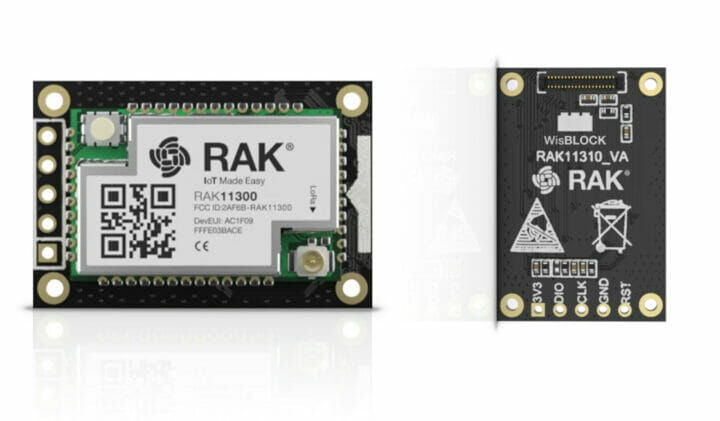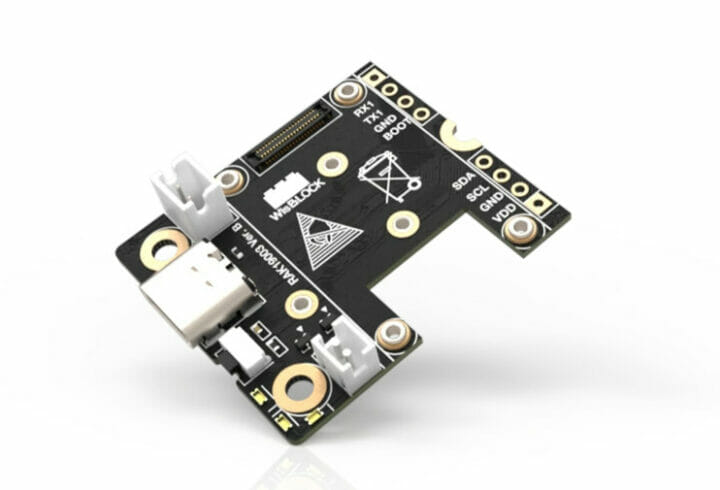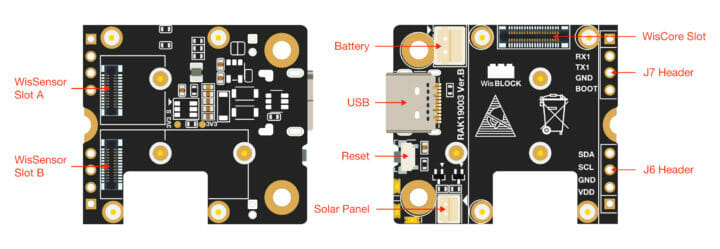RAKwireless has just launched the RAK11310 WisBlock LPWAN Module with Raspberry Pi RP2040 MCU and LoRaWAN connectivity, as announced after launching 14 new WisBlock modules for IoT prototyping last July.
The RAK11310 module was introduced as part of the “Just Track It RAK Autumn Launch 2021” event together with the smallest WisBlock Base Board so far, as well as 11 new Wisblock modules which bring the total to 47 modules.
RAK11310 – Raspberry Pi RP2040, LoRaWAN connectivity
-
RAK11300 WisDuo LPWAN Module
- MCU – Raspberry Pi RP2040 dual-core Cortex-M0+ microcontroller @ 133MHz with 246 kB RAM
- LoRa connectivity
- SX1262 LoRa transceiver
- Worldwide frequency coverage
- RAK11310L – EU433, CN470
- RAK11310 – EU868, US915, AU915, KR920, AS923, IN865, RU865
- LoRaWAN 1.0.2 protocol stack (supports Class A & C)
- I/O ports – UART, I2C, GPIO, USB through a “Wisconnector”
- Debugging – Serial Wire Debug (SWD) interface
- Supply Voltage – 2.0 V ~ 3.6 V
- Power consumption – Numbers not available yet
- Dimensions – 30 x 20 mm
- Temperature Range – -40°C to 70°C
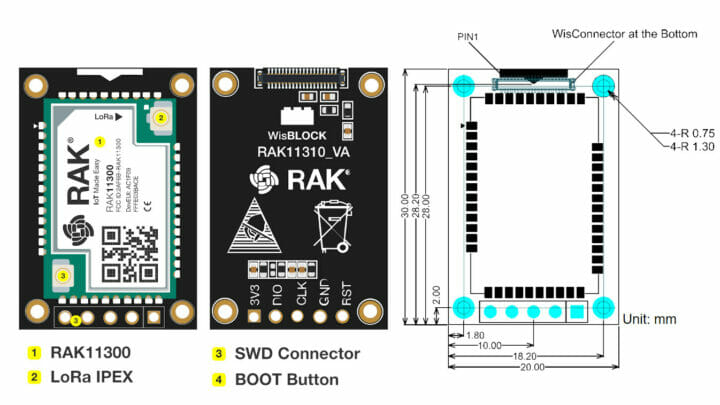 Additional hardware information can be found on the documentation website, where we also learn the module can be programmed with the Arduino IDE, PlatformIO, or MicroPython, but no details on how to do so. But a quick web search reveals the “Arduino BSP for RAKwireless WisBlock RAK11300 Core modules” in the RAK-RP-Arduino repository on Github, but there does not seem to be any resources related to MicroPython programming at this time. It should be similar to programming Raspberry Pi Pico with Micropython, but some libraries for LoRaWAN connectivity.
Additional hardware information can be found on the documentation website, where we also learn the module can be programmed with the Arduino IDE, PlatformIO, or MicroPython, but no details on how to do so. But a quick web search reveals the “Arduino BSP for RAKwireless WisBlock RAK11300 Core modules” in the RAK-RP-Arduino repository on Github, but there does not seem to be any resources related to MicroPython programming at this time. It should be similar to programming Raspberry Pi Pico with Micropython, but some libraries for LoRaWAN connectivity.
Wisblock RAK11310 core is sold for $9.95, while the RAK11300 RP2040 LoRaWAN module goes for $6.95.
RAK19003 WisBlock Base Board
The company also launched its smallest WisBlock base board so far with the RAK19003.
- Wisconnector for WisBlock Core MCU like the RAK11310 listed above
- 2x 24-pin Wiconnectors for WisBlock modules
- I2C, UART, GPIOs and analog input accessible with solder contacts
- Debugging – USB Type C debug port
- Misc – Reset button, 2 user-definable LED’s
- Power Supply
- 5V via USB port
- 3.7V via LiPo batteries
- 5V via solar panel(s)
- Multiple power inputs can be combined
- Dimensions – 35 x 30mm
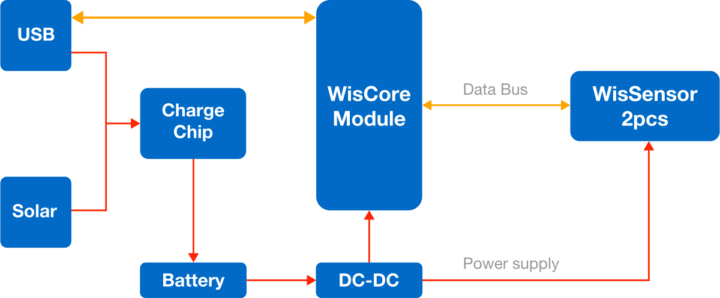
Again, you’ll find hardware documentation on RAKwireless website. The RAK19003 board sells for $8.99.
Autumn Launch 2021 modules
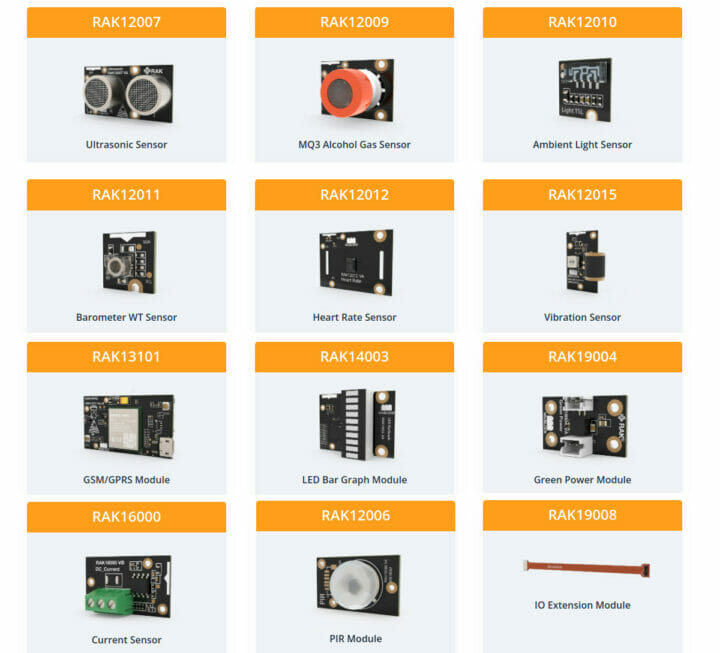 Besides the Raspberry Pi RP2040 LoRaWAN core module and a new Wisblock base board, RAKwireless also launched 11 new modules and one new IO Extension cable:
Besides the Raspberry Pi RP2040 LoRaWAN core module and a new Wisblock base board, RAKwireless also launched 11 new modules and one new IO Extension cable:
- RAK12006 PIR Module – A motion detection sensor for security systems to detect intruders, light automation.
- RAK12007 Ultrasonic Sensor – An obstacle detection and distance measurement module using ultrasonic waves which can detect objects up to a distance of 400 cm with an accuracy range of up to 3mm and a detection angle of 15 degrees.
- RAK12009 MQ3 Alcohol Gas Sensor – An alcohol sensor that can detect alcohol concentrations in the air between 25 to 500 ppm. Typical use cases include low-cost breathalyzers or air quality monitoring.
- RAK12010 Ambient Light Sensor – Measures light intensity ranging from 0 lux to 120000 lux.
- RAK12011 Barometer WT Sensor – A water-resistant barometric air pressure and temperature sensor for outdoor and weather applications. It can measure pressure ranging from 260 to 1260 hPa.
- RAK12012 Heart Rate Sensor – Based on the MAX30102 low-power sensor which can measure heart rate and pulse oximetry.
- RAK12015 Vibration Sensor
- RAK13101 GSM/GPRS Module – For 2G connectivity
- RAK14003 LED Bar Graph Module – A display module with 10 customizable LEDs
- RAK19004 Green Power Module – An external power converter to recharge your WisBlock from renewable power sources like wind generators, water turbines, solar panels, etc.
- RAK16000 Current Sensor – A DC Current Sensor module that can measure up to 3A.
- RAK19008 IO Extension Module – A 120mm extension cable for large WisBlock modules
You find more information about each module, as well as purchase links, on the “Just Track It” event page.

Jean-Luc started CNX Software in 2010 as a part-time endeavor, before quitting his job as a software engineering manager, and starting to write daily news, and reviews full time later in 2011.
Support CNX Software! Donate via cryptocurrencies, become a Patron on Patreon, or purchase goods on Amazon or Aliexpress


